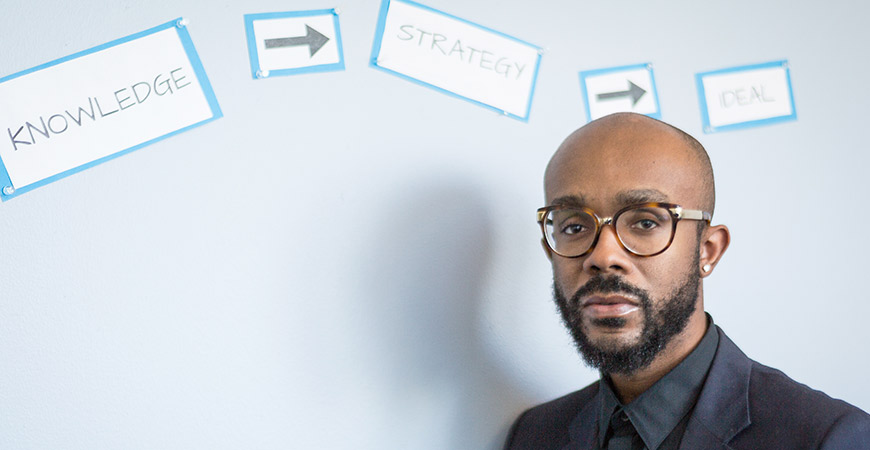
Jonathan Grady brings more than 14 years of experience as a researcher, educator and leader in academia to his new role as associate vice chancellor for Student Affairs and dean of students at UC Merced.
Grady comes from University of Michigan, Flint, where he was assistant vice chancellor of student success and was responsible for the vision and direction of Educational Opportunity Initiatives, Counseling and Psychological Services, Orientation, Disability and Accessibility Services, Intercultural Programming, and the Student Success Center.
In his new role, Grady oversees UC Merced’s Office of Student Life, Calvin E. Bright Success Center and the Student Response Team. He also works closely with the CARE Office and Basic Needs Security working group.
Grady received a bachelor’s degree in psychology and doctorate in Urban Schooling and Educational Policy from UCLA, and a master’s degree in African and African-American Studies from Cornell University.
In a recent interview, he shared insight into his goals and challenges.
Please describe your position as associate vice chancellor and dean of students.
My role focuses on how we can create an environment of success for our undergraduate and graduate students, as well as staff, faculty and community members, and sustain it over time. I see my role as helping us get to where we are all successful, thriving, succeeding, growing and learning.
I serve as an advocate for students by listening to and addressing their concerns. I help students, administrators and the larger community think about how we can address challenges in a way that makes sense and will push this campus forward.
What do you feel are the most important priorities for your position in the first six to 12 months?
In order to be the most successful, you have to genuinely and openly hear from all stakeholders. I’m taking the time to meet with students, staff members, and community members to hear their stories. What brought them to this campus? What brought them to this community? What are some of the challenges that they’ve noticed or faced? What would they love to see in the future? How can we all work together to make those things happen?
One thing I’d love to see prioritized in my first year is a clear, consistent definition of student success. If I ask a student, a staff or faculty member, or community member now, “How do we define student success?” I don’t know if that definition would be consistent. If we’re going to talk about a larger environment of success, we have to define what student success means for us.
Another priority for the Division of Student Affairs is integrated and innovative education. With the new general education curriculum coming this fall, we have an opportunity to integrate our services more and to be more innovative in the work that we do. I think that’s something UC Merced is great at already.
UC Merced is known for being a high-touch university. With the Merced 2020 Project coming, there are concerns about how we will sustain that high-touch practice as we reach up to 10,000 students. That’s another macro priority that we’re focusing on.
What are some of the challenges you face in your position?
When you are an advocate for students, a larger challenge is helping students understand what’s realistic. That’s a challenge I’ve faced at every institution, so I’ve created this model called “Knowledge, Strategy and Ideal” to help students think in ways that are strategic to ultimately get closer to things they want. This is something they can use while being student here, but also when they leave UC Merced.
For example, I’ve heard a lot from students about the microwave in the Campus Store. They ask, “Why can’t we go heat up our food that we bring to campus?” If the ideal is wanting more microwaves in the bookstore, let’s examine the knowledge piece — the research, history, best practices, current experiences and policies. You legally cannot have additional microwaves in that space if you want to bring in external food to heat it up. So, requesting additional microwaves in that space is not feasible. That doesn’t mean we can’t increase microwaves in other areas on campus. Another piece of knowledge is that we can’t use state funds to purchase microwaves. If someone wants to donate microwaves, fantastic. That switch then helps inform our strategy in terms of how we think about getting more microwaves on campus.
Given what we are facing nationally, globally and locally, morale — in terms of campus climate and people feeling safe — is another challenge and concern for students, staff and faculty. The notion of wellness and self-care has to continually be reinforced. Our staff and faculty members are so dedicated to our students, they aren’t often taking the time for themselves. If you want to be truly dedicated to students, you have to be well.
If we’re going to talk about a larger environment of success, we have to define what student success means for us.
What attracted you to UC Merced?
The ability to be able to be a part of the fabric of what is UC Merced and the strong history and the pride is very powerful. We have such amazing students with so much grit, resilience and brilliance. They are so well-rounded and bring such a rich story and history to this campus and larger community. The establishment of UC Merced in the Central Valley and what that means for this larger community and thinking about how this university was placed here to focus on access and increasing the college-going rates in the Central Valley was also key to my decision.
Another thing that brought me here is the notion of innovation. As a new campus, we are able to try new things and look at new models and be trendsetters. The more I learn about the work of my UC Merced colleagues reinforces why I am here. There are many amazing opportunities, programs and initiatives you don’t see elsewhere. To be a part of that and to help this university continue to move forward, is amazing.
Tell us a little about your experience working with UC Merced previously.
I worked in Admissions in 2007 as the first international specialist. I reviewed all international applications and also performed outreach at high schools.
I worked closely with several student clubs and organizations, including the students who brought First Lady Michelle Obama to campus to speak at commencement in 2009. When the initial idea came about, there was some resistance because others thought it wasn’t realistic. I encouraged the students to consider ways to try. They had letter writing campaigns and other initiatives, and she came! Seeing that was so powerful to me.
I loved my time while I was here and I only left to get my Ph.D. This was the perfect opportunity to come back and rejoin the Bobcat family. It all worked out.
Tell us a little about your last position at the University of Michigan, Flint.
I was assistant vice chancellor for student success, so I oversaw eight different units from our success center that housed academic advising and tutoring, to disability and accessibility services, outreach and community engagement. My role focused on retention. Flint is a very diverse campus just like UC Merced. There are also a lot of first-generation, low-income and underrepresented minorities. We used data and assessment to come up with various initiatives and programs and change different policies to focus on retention. When I left, we were able to see gains in our first-year fall-to-fall retention, which was fantastic.
Tell us something interesting about you that people might not know.
I’m a former child actor and performer. Growing up, I had an agent and did various educational movies, videos and commercials. I love to perform and do speeches and presentations. I try to be involved in the art community where ever I am at. For me, the arts is healing and transformational.
Brenda Ortiz

Senior Public Information Representative
Office: (209) 228-4203
Mobile: (209) 628-8263






